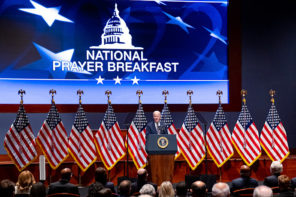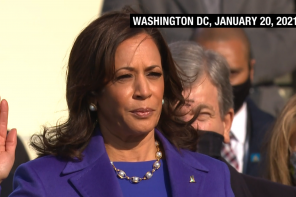The most astonishing thing about the ABC News revelations that military contractor Trijicon inscribed New Testament verses on its rifle sights is that getting rid of them hasn’t been a no-brainer.
Remember all the hand-wringing over taxpayers paying for other people’s abortions? Taxpayers have committed $660 million for the military’s contract with Trijicon, even though it hasn’t exactly been cagey about its worldview. “We believe that America is great when its people are good. This goodness has been based on biblical standards throughout our history and we will strive to follow those morals,” reads its web site.
Yet the military doesn’t seem sure whether Christian engraving on military equipment is a problem — or even what kind of problem it might be. In contrast, the New Zealand military has plans to remove the engravings and is reconsidering its contract with Trijicon, because “the lettering on the gunsights is fundamentally wrong, could be easily misconstrued and could raise religious tensions.”
Fundamentally wrong is hardly the sort of language you’d hear coming out of the U.S. military, which for years has acquiesced to proselytization in its ranks. From the AP:
A spokesman for U.S. Central Command, which manages military operations in Iraq and Afghanistan, said the sights don’t violate the ban on proselytizing because there’s no effort to distribute the equipment beyond the U.S. troops who use them.
Brilliant, right? We’re only going to shoot you with our John 8:12 rifle sight, not give it to you? Does the military seriously believe that government-to-servicemember evangelism is innocuous?
Another military spokesperson tried to downplay it:
“This situation is not unlike the situation with U.S. currency,” said the spokesman, Air Force Maj. John Redfield. “Are we going to stop using money because the bills have ‘In God We Trust‘ on them? As long as the sights meet the combat needs of troops, they’ll continue to be used.”
In a letter to President Obama, the Rev. Welton Gaddy, president of the Interfaith Alliance, noted the clear differences between “In God We Trust” on currency and the Trijicon engravings: “The verses chosen by Trijicon for their telescoping sights are testaments to the saving power of belief in Jesus Christ, and are clearly sectarian in nature.”
Faithful America, an arm of Faith in Public Life, has launched a “Not In Our Name” campaign, urging people to sign a petition calling on the Pentagon “to remove weapons with religious markings as soon as possible. Putting religious messages on tools of war is an abuse of faith and threatens our security.”
From a religious perspective, there’s obviously an argument to be made that Christianity shouldn’t be used to promote war, and shouldn’t be used to seemingly promote religious war between Christians and Muslims. But constitutionally speaking, the issue isn’t “abusing” faith but having it play a role at all. That’s a problem in the military that runs much deeper than Trijicon’s inscriptions.
UPDATE (1/22/10): Trijicon has agreed to voluntarily remove the scripture engravings from the sights.




